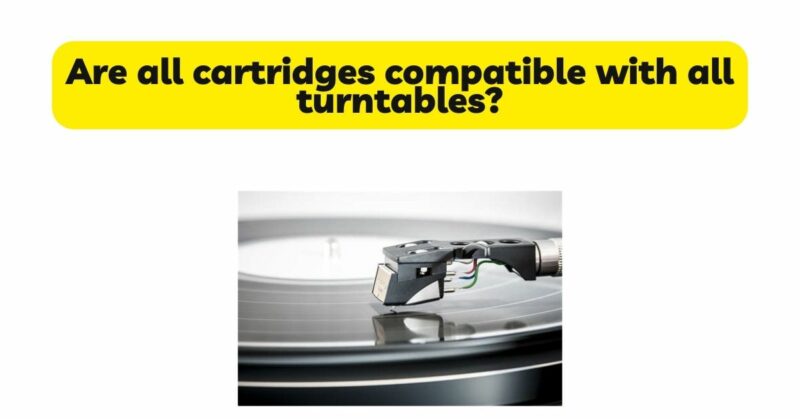Turntables and cartridges are essential components of a vinyl playback system, working together to produce the audio experience that vinyl enthusiasts cherish. However, it is important to recognize that not all cartridges are universally compatible with all turntables. In this article, we will delve into the factors that determine cartridge compatibility with turntables, allowing you to make informed decisions when selecting a cartridge for your specific setup.
- Cartridge Types and Mounting Styles: Cartridges come in different types, primarily moving magnet (MM) and moving coil (MC). MM cartridges are more common and generally less expensive, while MC cartridges often offer higher fidelity at a higher cost. Alongside cartridge types, mounting styles play a significant role in compatibility. The most prevalent mounting styles are standard mount (also known as 1/2 inch mount) and P-mount (T4P). It is crucial to understand your turntable’s cartridge requirements, as different turntables are designed to accommodate specific types and mounting styles.
- Tonearm Specifications: One critical aspect affecting cartridge compatibility is the tonearm specifications of a turntable. The tonearm is responsible for holding and positioning the cartridge as it tracks the record grooves. Different turntables feature diverse tonearm characteristics, such as effective mass, effective length, and tracking force range. These specifications are crucial for proper cartridge alignment and performance. It is vital to select a cartridge that matches your turntable’s tonearm specifications to ensure optimal tracking and audio quality.
- Cartridge Weight and Compliance: Cartridge weight and compliance are additional factors to consider when assessing compatibility. Cartridge weight refers to the mass of the cartridge body, while compliance pertains to the flexibility of the cartridge’s suspension system. Both weight and compliance must be taken into account to achieve the ideal balance between tracking ability and record preservation. Turntables are designed to handle specific ranges of cartridge weight and compliance, ensuring optimal performance. Using a cartridge that deviates significantly from the recommended specifications can result in poor tracking, increased record wear, and potential damage.
- Wiring and Connection: The wiring and connection configuration of a turntable’s tonearm also plays a role in cartridge compatibility. Some turntables feature detachable headshells, allowing for easy cartridge replacement, while others have integrated tonearms with fixed wiring. The type of cartridge you can install depends on your turntable’s headshell or wiring configuration. Additionally, the electrical connection between the cartridge and the tonearm must match to ensure proper signal transmission. Understanding your turntable’s wiring and connection options is essential when selecting a compatible cartridge.
- Unique Turntable Features: Certain turntables possess unique features or specifications that may influence cartridge compatibility. For instance, adjustable counterweights and anti-skate mechanisms aid in achieving proper tracking and preventing the stylus from skipping across the record surface. Other features, such as adjustable VTA (Vertical Tracking Angle) or azimuth, allow fine-tuning for optimal performance. It is crucial to consult your turntable’s user manual or contact the manufacturer to understand any specific requirements or recommendations for cartridge compatibility.
- Upgrading Cartridges and Compatibility: If you are considering upgrading the cartridge on your turntable, compatibility becomes even more critical. Upgrading to a higher-quality cartridge can enhance audio fidelity and overall listening experience. However, it is essential to research and select a cartridge that is not only compatible with your turntable but also an improvement over the existing cartridge. Consider factors such as stylus shape, material, tracking ability, and overall construction quality. Additionally, keep in mind that certain high-end cartridges may require specialized phono preamps or additional equipment for optimal performance.
Conclusion: While turntables and cartridges are integral to the vinyl listening experience, it is important to understand that not all cartridges are universally compatible with all turntables. Cartridge compatibility depends on factors such as cartridge type, mounting style, tonearm specifications, weight, compliance, wiring, and unique turntable features. By understanding these factors and ensuring compatibility, you can achieve optimal audio performance, prolong the life of your vinyl records, and fully enjoy the rich, analog sound that vinyl has to offer. When in doubt, consult the turntable’s documentation, reach out to the manufacturer, or seek advice from audio experts to ensure cartridge compatibility and make informed decisions.


